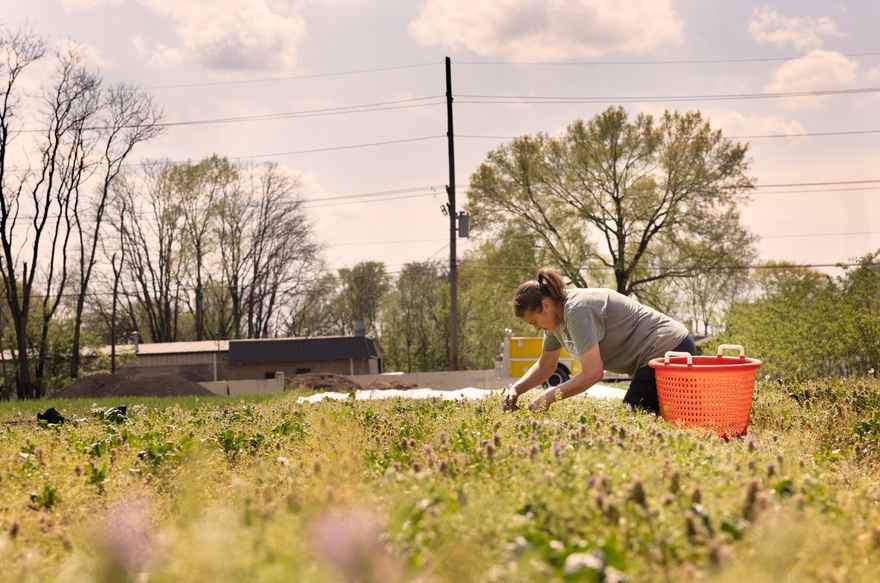Small Farm Hiring Tips: Building a Solid Team

When you first start to hire help for your small farm, it’s a difficult transition to make. You've put sweat and tears into your farm. It's your income source, but also the lifestyle and operation that you've built with your own two hands.
The last thing you want is a group of inexperienced people messing with the farm you so carefully tend.
However, unless you have a very small, tight-knit operation that you can run with just your family, you need employees to maintain a successful farm. Eventually you will reach the point where you can no longer run everything by yourself.
Unfortunately, finding reliable employees is easier said than done. When you hire somebody new, they might be great. Or they might show up late, steal from you, forget to water, struggle with simple math...I could go on. We've had our share of both good and bad employees here at the Farm on Central, and over time we've had to continually refine our hiring process. There have been a lot of lessons learned along the way, which I can't wait to share with you today!
If you've been struggling to find the right help, I hope these tips are useful for refining your own hiring process and choosing the best employees for your farm.
Lesson #1: Figure out your exact needs
When we first kicked off the Farm on Central, we would hire local teens to come help out in the mornings. Obviously, as the farm grew, we realized we would need full-time adult employees who could manage farm tasks even during times when we weren't there. We started looking for employees with a completely different set of qualifications.
For your own farm, it's important to figure out exactly what you're looking for. Do you want to bring in interns? Hire seasonal hourly employees who can do multiple jobs? Fill specific part-time or full-time roles on your farm? Have a good understanding of your needs, and who you need to hire to fill them.
You also need a solid idea of which jobs you want your employees to perform. Will they assist in daily chores? Run your farm store? Help you harvest your crops? Or will you train them to be familiar with all of your farm operations?
Lesson #2: Build a comprehensive job application
The more comprehensive your job application, the more people will get weeded out from the beginning. That's a good thing! The application should be highly selective, so you're not wasting your time interviewing people who are not going to be a good fit. Throw some twists in your application, and ask the practical questions!
For example, we put the following practical math problem in our job application:
"Thomas has to pick 200 squash plants. Each plant typically yields 4 oz of squash. He has 2 large baskets that hold 20# each, and one small basket that holds 7#. Does he have enough baskets? Show your math."
It's a simple problem, but about 30% of applicants get this question wrong!
While we don't want to exclude applicants solely based on low math aptitude, it's definitely a large indicator as to whether someone will thrive on the farm or not. After all, being able to do basic math is essential for many of the tasks. We try to think ahead, and give applicants practical problems that might be similar to what they will experience on the farm.
Lesson #3: Look for passion, character, and values
We can train experience! Character and work ethic...those we can't train.
As you build out your job description and application, then eventually move on to the interview stage, keep this in mind. Ask the hard questions in your job application. During the interview stage, really engage with your prospects and try to get a good feel for their values and mindset.
Experience is definitely something to look for. But it shouldn't be the key factor in determining who you hire!
Lesson #4: Hold working interviews & set a probation time
Someone may look like a great prospect on paper...until you get them out in the field.
Before hiring someone, we always have them come out to the farm for a working interview. Some people love it. With others, you can tell right away that they're not going to thrive on a farm.
In other words, have your prospects spend some time in your farm environment before you make a final decision.
That's why we also set a probation time of 30 days with our new employees. Thirty days is generally enough time for us to get a good feel for someone's character. It's also enough time for them to either settle in or feel like they need to move on. We've definitely had a few employees walk after the thirty-day period, after deciding our farm culture wasn't a good fit.
I'm sure you have your own hiring process, but these are lessons learned that can apply to everyone. It's also very important to think ahead! If you wait last minute to hire, you'll be more likely to rush the process, and end up hiring someone who isn't going to make a good employee. So plan ahead, and be deliberate. Bring in people who really care about your farm like you do!
Get more farm & business tips in your inbox every Friday!
(Plus get all the details when new courses or events are out.)


0 comments
Leave a comment
Please log in or register to post a comment